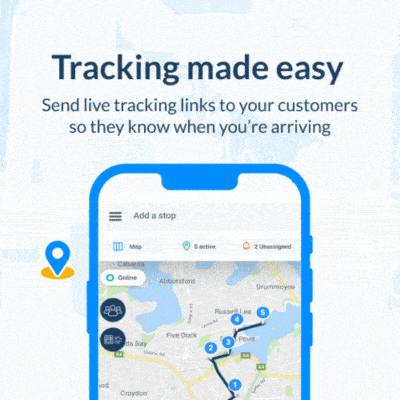Here’s what you need to know about GPS tracking for your fleet!
The use of GPS tracking has become increasingly important for fleet management. GPS tracking is used by fleet managers to boost productivity, increase safety, cut expenses, and deliver better customer service.
Yet, how does GPS tracking operate, what advantages does it provide, and what aspects should you take into account when selecting a system? These and other inquiries will be addressed in the following paragraphs.

How does GPS tracking work?
The Global Positioning System is known as GPS. It is a satellite-based navigation system that can tell you where you are on the Planet and what time it is.
GPS tracking devices use satellite communication to relay their location data to a central server utilizing GPS technology. Fleet managers can keep track of the whereabouts of their cars in real time and make data-driven choices.
Benefits of GPS tracking for fleet management
The use of GPS tracking, a game-changing innovation, has completely changed fleet management. GPS tracking is being used more frequently by fleet managers to monitor their fleets, lower expenses, increase efficiency and improve safety.
Reduced costs
The potential for cost reduction is one of the most important advantages of GPS tracking. Fleet managers can optimize routes, cut down on idle time, and measure fuel usage via GPS tracking. They can greatly lower the cost of repairs, maintenance, and gasoline by doing this. More cost reductions may result from using GPS tracking to stop theft and unlawful usage of cars.
Enhanced efficiency
Fleet managers can become more effective by using GPS tracking. Fleet managers can keep track of the whereabouts of their cars in real time and make data-driven choices.
Fleet managers may boost productivity and increase the number of jobs finished in a day by optimizing routes, cutting down on travel time, and eliminating downtime. Fleet managers can boost productivity by using GPS tracking to manage their drivers’ schedules and track their performance.
Increased safety
Fleet managers place a high focus on safety, which may be improved in a number of ways thanks to GPS tracking. Fleet management can monitor driver behavior with GPS tracking, including speeding, abrupt stopping, and abrupt acceleration.
They can then spot risky driving behaviors and take appropriate action. Fleet managers can take rapid action by being alerted in real-time and receiving real-time accident detection assistance from a GPS tracker. GPS tracking can also aid in recovering stolen fleet vehicles and preventing car theft.
Better customer experience
Fleet managers can improve customer service by using GPS tracking. Fleet managers can raise customer satisfaction by giving precise delivery estimates, real-time updates, and delivery documentation.
Fleet managers may monitor the whereabouts of their cars and modify their schedules to suit customer needs with the aid of GPS tracking. They will be able to offer more individualized service and forge closer bonds with their clients as a result.

What You Need to Know About GPS Tracking for Your Fleet
Fleet managers should think about the following factors when choosing between GPS fleet tracking services:
Size of the fleet
The size of the fleet may impact the kind of GPS tracking system used. While bigger fleets may need more sophisticated services like real-time tracking, driver performance monitoring, and maintenance schedules, smaller fleets could only need the most basic tracking tools.
Cost
Depending on the device type, functionality, and services provided, GPS tracking systems might range in price. Managers of fleets should carefully assess expenditures and calculate the ROI.
Features
Various GPS tracking devices provide various capabilities, including real-time tracking, geofencing, tracking driver performance, and scheduling maintenance. Managers of fleets should assess their requirements and capabilities to decide which features are required.
User interface
A GPS tracking system’s usability and effectiveness may be impacted by its user interface. To make sure it fits their needs, fleet managers should assess the user interface.
Legal considerations
The legal implications of GPS tracking technology, such as data protection laws, employee monitoring regulations, and privacy issues, should also be taken into account by fleet managers.
Fleet managers should communicate with their drivers and staff about the usage of GPS tracking while also abiding by all applicable rules and regulations.
Implementation and integration
Planning and carrying out the installation of a GPS tracking system demands caution. Fleet managers should pick the best supplier, make sure the system is installed correctly, give sufficient training, and, if necessary, integrate it with other systems.
Best practices for GPS tracking in fleet management
Define your tracking goals.
It’s critical to establish your tracking goals before putting a GPS tracking system into place. What do you hope to achieve using GPS tracking in fleet management?
Do you wish to optimize routes, increase safety, or use less fuel? You can choose the best tracking system and make sure that it satisfies your needs by outlining your tracking objectives.
Educate your drivers
Some drivers may find it difficult to get used to GPS trackers, especially if they are not accustomed to being watched.
Your drivers must be properly trained on how to operate the system, the types of data being gathered, and the intended uses for that data. This will assure their support and lessen any potential opposition.
Communicate with your drivers.
Regular communication with your drivers is also crucial. Inform them of your use of GPS fleet tracking and the advantages it brings to the business and the drivers. Be open and honest about the information gathered and its intended purpose. This will promote cooperation and mutual trust.
Use GPS data to improve routes.
Route optimization is made possible by the real-time traffic data that GPS tracking may provide. You may decrease fuel usage, save time, and boost productivity by optimizing your trips. The usage of GPS data can also help you operate more effectively by preventing accidents, road closures, and traffic jams.
Monitor driver behavior
GPS tracking devices can keep an eye on your fleet operations for driving habits like speeding, abrupt braking, and acceleration. You can spot areas for improvement in driver behavior by observing their conduct, and you can then offer training to help drivers develop better driving practices. This may result in increased safety, decreased fuel usage, and less deterioration of the vehicles.
Use GPS data for preventative maintenance
Data on a vehicle’s performance, such as the number of engine hours, fuel efficiency, and tire pressure, can also be obtained using vehicle tracking software. Using this information will enable you to put in place a preventive maintenance program, lowering the likelihood of unanticipated failures and lowering repair costs.
Types of GPS tracking devices
OBD2 Port Device
With this small, portable GPS tracking device, you can switch between vehicles in your fleet without having to install it because it simply plugs into your car. This allows you to maintain track of your vehicles even when you’re not nearby.
Rugged GPS Hardwired Device
This incredibly tough device is permanently hardwired to your car, providing stronger security and a lower risk of theft. It is appropriate for cars, trucks, motorcycles, and heavy machinery.
Batter Powered Device
Using this battery-operated device, you can track anything, including bicycles, pallets, shipping containers, etc. because it doesn’t need a power source.
The main objective of this gadget, which has a battery life of up to 7 years for long-term asset tracking and theft recovery, is security because it’s possible for items to be stolen and left at the wrong job site.

Track your fleet with Locate2u
With the use of Locate2u’s GPS tracking system, fleet managers and business owners can track the location of their fleet in real-time.
Users of our software can access geofencing, which creates a virtual fence around a certain area and activates alarms whenever a vehicle enters or leaves it.
Learn more about GPS fleet tracking by clicking here!
Share this article
About the author
Founder and CEO at Zoom2u & Locate2u (ASX:Z2U). Steve has significant software development and entrepreneurial experience. Operating in the delivery space for more than 15-years, he actively contributes to the development of the industry. He has a strong focus on job management and job despatch systems.














